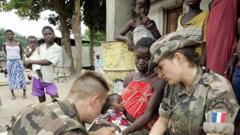In a significant move towards redefining military relations in West Africa, Ivory Coast's President Alassane Ouattara has announced the withdrawal of French troops from the nation, aligning with regional trends of reducing foreign military influence. French military presence, a vestige of colonialism, has been in decline as local forces take on greater responsibility.
Ivory Coast Announces Withdrawal of French Troops Amidst Evolving Military Dynamics

Ivory Coast Announces Withdrawal of French Troops Amidst Evolving Military Dynamics
President Alassane Ouattara signals the end of French military presence in Ivory Coast, emphasizing national sovereignty and modernization of local armed forces.
In his year-end address, Ivory Coast's President Alassane Ouattara confirmed that French troops will exit the nation as part of a broader strategy to modernize the Ivorian military. This decision reflects a growing trend across West Africa where former colonies are seeking greater autonomy from their past colonial powers. Currently, approximately 600 French troops are stationed in Ivory Coast, which hosts the largest contingent in the region.
President Ouattara emphasized the concerted nature of this withdrawal, stating that the French-run military infantry battalion in Port Bouét will be fully transitioned to Ivorian control. This move mirrors similar decisions in neighboring countries, including Senegal, which recently mandated the closure of French military bases by 2025. Senegalese President Bassirou Dioumaye Faye articulated a new defense strategy aimed at asserting national sovereignty, aligning with the sentiments arising from a wave of anti-French sentiment.
The French military's retreat from Africa started to gain momentum following military coups in Mali, Burkina Faso, and Niger, where rising anti-French protests led to the termination of defense agreements. Following this trend, Chad, a key partner in the anti-terrorism fight, also suspended its military cooperation with France earlier this month.
As France diminishes its troop presence in the region, political analysts suggest that it is attempting to recalibrate its military strategies to adapt to the shifting political landscape in West Africa, including increased ties between local regimes and other powers like Russia. Amidst this turmoil, Ivory Coast continues to remain stable, being the world's largest cocoa producer, with citizens enjoying a relatively high standard of living in comparison to other nations in the region. This resilience highlights the country’s complex dynamic of navigating between historical alliances and future independence.
President Ouattara emphasized the concerted nature of this withdrawal, stating that the French-run military infantry battalion in Port Bouét will be fully transitioned to Ivorian control. This move mirrors similar decisions in neighboring countries, including Senegal, which recently mandated the closure of French military bases by 2025. Senegalese President Bassirou Dioumaye Faye articulated a new defense strategy aimed at asserting national sovereignty, aligning with the sentiments arising from a wave of anti-French sentiment.
The French military's retreat from Africa started to gain momentum following military coups in Mali, Burkina Faso, and Niger, where rising anti-French protests led to the termination of defense agreements. Following this trend, Chad, a key partner in the anti-terrorism fight, also suspended its military cooperation with France earlier this month.
As France diminishes its troop presence in the region, political analysts suggest that it is attempting to recalibrate its military strategies to adapt to the shifting political landscape in West Africa, including increased ties between local regimes and other powers like Russia. Amidst this turmoil, Ivory Coast continues to remain stable, being the world's largest cocoa producer, with citizens enjoying a relatively high standard of living in comparison to other nations in the region. This resilience highlights the country’s complex dynamic of navigating between historical alliances and future independence.



















